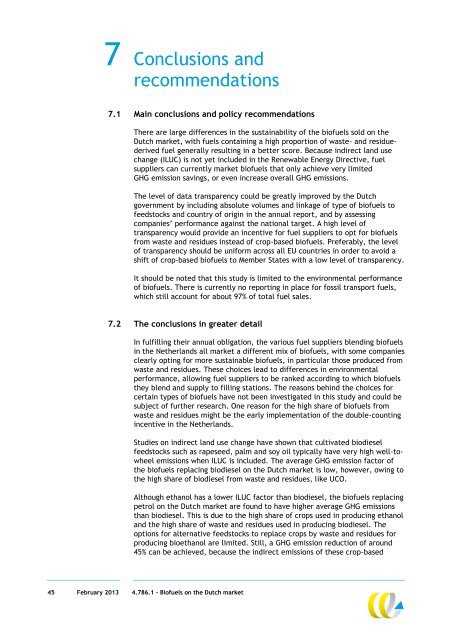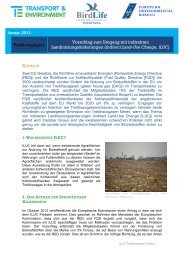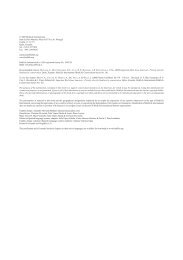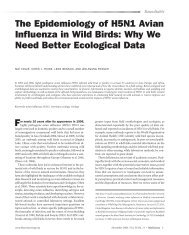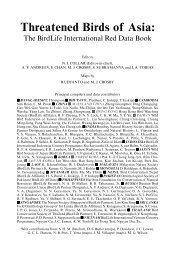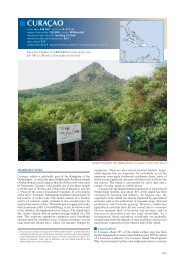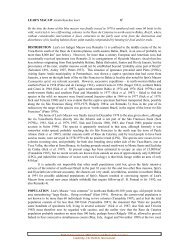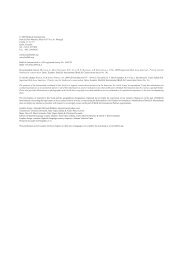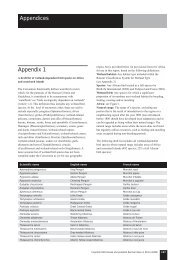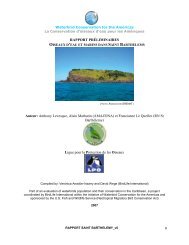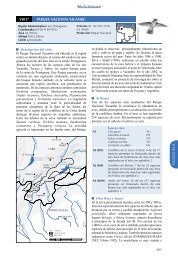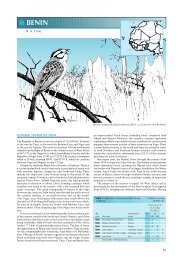Biofuels on the Dutch market - BirdLife International
Biofuels on the Dutch market - BirdLife International
Biofuels on the Dutch market - BirdLife International
Create successful ePaper yourself
Turn your PDF publications into a flip-book with our unique Google optimized e-Paper software.
7 C<strong>on</strong>clusi<strong>on</strong>s and<br />
recommendati<strong>on</strong>s<br />
7.1 Main c<strong>on</strong>clusi<strong>on</strong>s and policy recommendati<strong>on</strong>s<br />
There are large differences in <strong>the</strong> sustainability of <strong>the</strong> biofuels sold <strong>on</strong> <strong>the</strong><br />
<strong>Dutch</strong> <strong>market</strong>, with fuels c<strong>on</strong>taining a high proporti<strong>on</strong> of waste- and residuederived<br />
fuel generally resulting in a better score. Because indirect land use<br />
change (ILUC) is not yet included in <strong>the</strong> Renewable Energy Directive, fuel<br />
suppliers can currently <strong>market</strong> biofuels that <strong>on</strong>ly achieve very limited<br />
GHG emissi<strong>on</strong> savings, or even increase overall GHG emissi<strong>on</strong>s.<br />
The level of data transparency could be greatly improved by <strong>the</strong> <strong>Dutch</strong><br />
government by including absolute volumes and linkage of type of biofuels to<br />
feedstocks and country of origin in <strong>the</strong> annual report, and by assessing<br />
companies’ performance against <strong>the</strong> nati<strong>on</strong>al target. A high level of<br />
transparency would provide an incentive for fuel suppliers to opt for biofuels<br />
from waste and residues instead of crop-based biofuels. Preferably, <strong>the</strong> level<br />
of transparency should be uniform across all EU countries in order to avoid a<br />
shift of crop-based biofuels to Member States with a low level of transparency.<br />
It should be noted that this study is limited to <strong>the</strong> envir<strong>on</strong>mental performance<br />
of biofuels. There is currently no reporting in place for fossil transport fuels,<br />
which still account for about 97% of total fuel sales.<br />
7.2 The c<strong>on</strong>clusi<strong>on</strong>s in greater detail<br />
In fulfilling <strong>the</strong>ir annual obligati<strong>on</strong>, <strong>the</strong> various fuel suppliers blending biofuels<br />
in <strong>the</strong> Ne<strong>the</strong>rlands all <strong>market</strong> a different mix of biofuels, with some companies<br />
clearly opting for more sustainable biofuels, in particular those produced from<br />
waste and residues. These choices lead to differences in envir<strong>on</strong>mental<br />
performance, allowing fuel suppliers to be ranked according to which biofuels<br />
<strong>the</strong>y blend and supply to filling stati<strong>on</strong>s. The reas<strong>on</strong>s behind <strong>the</strong> choices for<br />
certain types of biofuels have not been investigated in this study and could be<br />
subject of fur<strong>the</strong>r research. One reas<strong>on</strong> for <strong>the</strong> high share of biofuels from<br />
waste and residues might be <strong>the</strong> early implementati<strong>on</strong> of <strong>the</strong> double-counting<br />
incentive in <strong>the</strong> Ne<strong>the</strong>rlands.<br />
Studies <strong>on</strong> indirect land use change have shown that cultivated biodiesel<br />
feedstocks such as rapeseed, palm and soy oil typically have very high well-towheel<br />
emissi<strong>on</strong>s when ILUC is included. The average GHG emissi<strong>on</strong> factor of<br />
<strong>the</strong> biofuels replacing biodiesel <strong>on</strong> <strong>the</strong> <strong>Dutch</strong> <strong>market</strong> is low, however, owing to<br />
<strong>the</strong> high share of biodiesel from waste and residues, like UCO.<br />
Although ethanol has a lower ILUC factor than biodiesel, <strong>the</strong> biofuels replacing<br />
petrol <strong>on</strong> <strong>the</strong> <strong>Dutch</strong> <strong>market</strong> are found to have higher average GHG emissi<strong>on</strong>s<br />
than biodiesel. This is due to <strong>the</strong> high share of crops used in producing ethanol<br />
and <strong>the</strong> high share of waste and residues used in producing biodiesel. The<br />
opti<strong>on</strong>s for alternative feedstocks to replace crops by waste and residues for<br />
producing bioethanol are limited. Still, a GHG emissi<strong>on</strong> reducti<strong>on</strong> of around<br />
45% can be achieved, because <strong>the</strong> indirect emissi<strong>on</strong>s of <strong>the</strong>se crop-based<br />
45 February 2013 4.786.1 - <str<strong>on</strong>g>Biofuels</str<strong>on</strong>g> <strong>on</strong> <strong>the</strong> <strong>Dutch</strong> <strong>market</strong>


